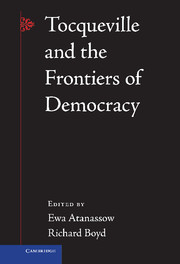Book contents
- Frontmatter
- Contents
- List of Contributors
- Short Title Abbreviations of Tocqueville's Major Works
- Acknowledgments
- Introduction: Tocqueville and the Frontiers of Democracy
- Part One The Meaning of Democracy and the Democratic Revolution
- Part Two Democratization in a Non-Western Context
- Part Three Challenges of Globalization: Democracy, Markets, and Nationhood
- Part Four Democracy, Imperialism, and Foreign Policy
- Part Five Democracy's Old and New Frontiers
- Epilogue: New Frontiers, Old Dilemmas
- Bibliography of Works Cited
- Index
- References
Introduction: Tocqueville and the Frontiers of Democracy
Published online by Cambridge University Press: 05 April 2013
- Frontmatter
- Contents
- List of Contributors
- Short Title Abbreviations of Tocqueville's Major Works
- Acknowledgments
- Introduction: Tocqueville and the Frontiers of Democracy
- Part One The Meaning of Democracy and the Democratic Revolution
- Part Two Democratization in a Non-Western Context
- Part Three Challenges of Globalization: Democracy, Markets, and Nationhood
- Part Four Democracy, Imperialism, and Foreign Policy
- Part Five Democracy's Old and New Frontiers
- Epilogue: New Frontiers, Old Dilemmas
- Bibliography of Works Cited
- Index
- References
Summary
Introduction
Few thinkers in the history of Western political thought are as widely cited as Alexis de Tocqueville. Among the legions of U.S. pundits and policy makers who have invoked the Frenchman's authority, Ronald Reagan, George W. Bush, and Bill Clinton all bolstered their speeches with choice quotes from Tocqueville's Democracy in America. Tocqueville is embraced across the political spectrum in the United States and Europe for his advocacy of civic engagement and civil society, his praise of religion's salutary role in public life, his warnings about the growth of the centralized state, and his sometimes biting observations about the leveling tendencies of democratic culture. His thoughts on democracy in America seem to resonate just as strongly today as when they appeared in the first half of the nineteenth century.
Even so, Tocqueville's ubiquity may actually detract from the subtlety of his message. It is difficult enough to characterize Tocqueville's domestic political theory – as a nostalgic conservatism, skeptical liberalism, communitarianism, or radical participatory democracy – but the confusion is only amplified when one looks beyond the relatively settled frontiers of American or Western-European democracy. His insights into the challenges of a globalizing age are among the most neglected and misunderstood parts of his political theory. Despite a recent surge of interest in Tocqueville's writings on empire, foreign policy, and European affairs, his thoughts on international relations are overshadowed by his famous book on America.
- Type
- Chapter
- Information
- Tocqueville and the Frontiers of Democracy , pp. 1 - 30Publisher: Cambridge University PressPrint publication year: 2013



